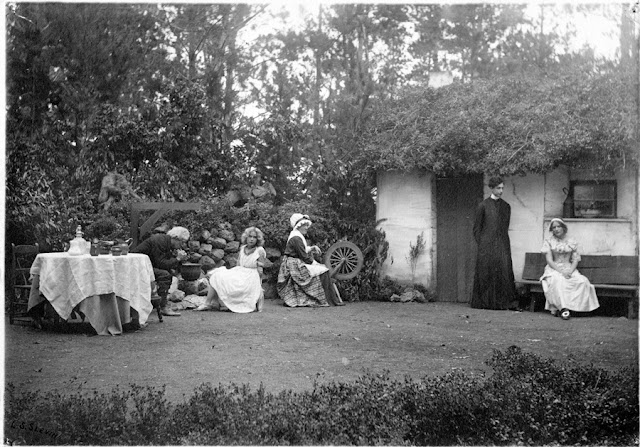In the next few posts I want to share a bit of my research on Ella Young and her involvement with several key people that helped to shape California’s culture in the first decades of the 20th century - Albert Bender, Noel Sullivan, Robinson and Una Jeffers, and John and Mollie O’Shea. In particular, I will show how their lives wove together like a magic carpet - with threads of poetry, music, drama, and art - and through Ella’s unique gifts and vision the Old Ways were once again spoken of and honored.
It is not hard to envision how it looked and felt in Carmel in those early years and how those drawn to the mystical world of Celtic legends might find here a land pulsing with the same ethereal spirit - with wind-twisted cypresses draped in silvery mist and Manannan, Son of Lir commanding the white-capped waves of the mighty Pacific.
Ella Young was drawn to the land that hosted Carmel and its neighbors to the south - Point Lobos and Big Sur. Ella sensed the presence here of a magic akin to what she had left behind in Ireland. In her first lecture in Carmel, in 1926 at the Theatre of the Golden Bough on Ocean Avenue, she spoke on two topics: “Nature Magic” and “The Celtic Myth of Creation.” It was later reported that Ella told her Carmel audience that faeries had found a home at Point Lobos - such was the unspoiled power of this place at that time. Apparently, the following day several women from the village were spotted at Point Lobos peering under ferns and behind rocks all in pursuit of the wee folk.
One of the first plays performed on Carmel’s historic outdoor stage - The Forest Theater was W.B. Yeat’s The Land of Heart’s Desire in 1911. It was directed by the theater’s founder, Herbert Heron and set in County Sligo, Ireland (not far from where I called home for an amazing year).
 |
| The Herbert Heron Collection, The Henry Meade Williams Local History Room, Harrison Memorial Library, Carmel, CA |
In 1911, many of the people that would become part of Ella’s circle had not yet moved to Carmel. The village was already preparing itself for her arrival and every year another poet, artist or mystic found their way to the tiny village with the alabaster white sands skirting the sea - all a-glimmer and so very alive.
I see the performance of Yeats’ play as the beginning of what I call Carmel’s Celtic Twilight and it is easy to understand how, fifteen years later, the village would enthusiastically embrace Ella Young.
 |
| The Herbert Heron Collection, The Henry Meade Williams Local History Room, Harrison Memorial Library, Carmel, CA |
In this excerpt, we see a struggle occurring between the new religion, Christianity, and the Old Ways, personified here in “The Child” - a faery spirit.
FATHER HART. I will confront this mighty spirit alone.
Be not afraid, the Father is with us,
The Holy Martyrs and the Innocents,
The adoring Magi in their coats of mail,
And He who died and rose on the third day
And all the nine angelic hierarchies.
(THE CHILD kneels upon the settle beside MARY and puts her arms about her.)
Cry, daughter, to the Angels and the Saints.
THE CHILD. You shall go with me, newly-married bride,
And gaze upon a merrier multitude.
White-armed Nuala, Aengus of the Birds,
Feacra of the hurtling foam, and him
Who is the ruler of the Western Host,
Finvarra, and their Land of Heart's Desire,
Where beauty has no ebb, decay no flood,
But joy is wisdom, Time an endless song.
I kiss you and the world begins to fade.
White-armed Nuala, Aengus of the Birds,
Feacra of the hurtling foam, and him
Who is the ruler of the Western Host,
Finvarra, and their Land of Heart's Desire,
Where beauty has no ebb, decay no flood,
But joy is wisdom, Time an endless song.
I kiss you and the world begins to fade.
[and as the play nears its end]
(Outside there are dancing figures, and it may be a white bird, and many voices singing.)
"The wind blows out of the gates of the day,
The wind blows over the lonely of heart,
And the lonely of heart is withered away;
While the faeries dance in a place apart,
Shaking their milk-white feet in a ring,
Tossing their milk-white arms in the air;
For they hear the wind laugh and murmur and sing
Of a land where even the old are fair,
And even the wise are merry of tongue;
But I heard a reed of Coolaney say--
When the wind has laughed and murmured and sung,
The lonely of heart is withered away."'
The wind blows over the lonely of heart,
And the lonely of heart is withered away;
While the faeries dance in a place apart,
Shaking their milk-white feet in a ring,
Tossing their milk-white arms in the air;
For they hear the wind laugh and murmur and sing
Of a land where even the old are fair,
And even the wise are merry of tongue;
But I heard a reed of Coolaney say--
When the wind has laughed and murmured and sung,
The lonely of heart is withered away."'

